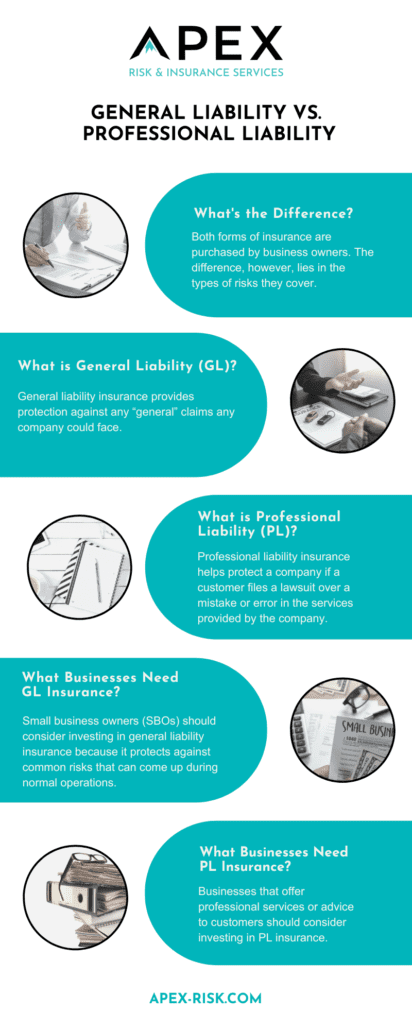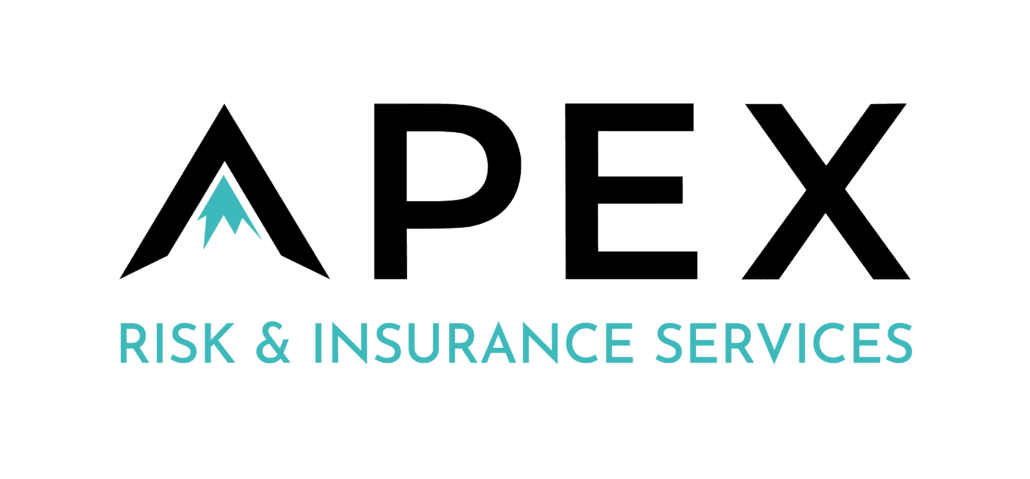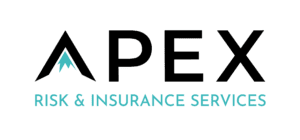General Liability vs. Professional Liability: What’s the Difference?
As a business owner, it can be difficult to decide what forms of liability insurance you’ll need to protect your business. The best policies for you depend on multiple factors, such as your
- Industry
- Services, and
- Business risks
However, choosing the right insurance doesn’t have to be a nightmare. At Apex Risk & Insurance Services, we’re here to break down the difference between these forms of liability insurance.
Read on to learn what general and professional liability cover, and what kinds of businesses benefit the most from each.
What is the Difference Between General Liability and Professional Liability Insurance?
First and foremost, both forms of insurance are purchased by business owners.
The difference, however, lies in the types of risks they cover.
It may help to think of it like this: General liability covers physical risks (i.e. bodily injuries or damage to property) whereas professional liability covers abstract risks (i.e. a mistake in the services your business provides or inaccurate advice).
Everything You Need to Know About General Liability Insurance
What is General Liability Insurance?
General liability insurance protects against any “general” claims a company could face.
What Does General Liability Insurance Cover?
General liability insurance, also referred to as business liability insurance or commercial liability insurance, can help cover:
- Medical payments if another person or party is injured on your commercial property.*
- Property damage if your business or employees cause damage to another person’s property.
- Advertising injuries if your business is sued for copyright infringement in your advertisement.
- Bodily injury claims if someone is injured at the site of business.
- Reputational harm if you face a lawsuit for libel, malicious prosecution, slander, privacy, or wrongful eviction.
*General liability insurance doesn’t cover employee injuries. Business owners can use worker’s compensation insurance to help cover work-related injuries or illnesses.
What Does General Liability Insurance Not Cover?
Typically, business liability insurance does not cover:
- Employee’s work-related injuries or illnesses. To help cover employees’ medical bills or other costs, small business owners (SBOs) can use workers’ compensation insurance.
- Employment-related claims such as discrimination, sexual harassment, or wrongful termination. These kinds of claims can be covered under employment practices liability insurance (EPLI).
- Errors in professional services that your company provides to customers. For this, SBOs will need professional liability insurance.
How Does General Liability Insurance Work?
To protect your business, general liability insurance policies must typically be in place when the incident occurs.
However, general liability policies can provide retroactive coverage after you stop paying premiums. This extended coverage can often be purchased for an additional cost when you select your policy.
What Businesses Need General Liability Insurance?
Small business owners should consider investing in general liability insurance because it protects against common risks that can come up during normal operations.
These risks can be as simple as a customer walking onto property, slipping on a wet floor, and breaking their ankle. General liability insurance can help cover medical expenses for this individual.
Everything You Need to Know About Professional Liability Insurance
What is Professional Liability Insurance?
Professional liability insurance helps protect a company if a customer files a lawsuit over a mistake or error in the services provided by the company.
Professional liability insurance includes several different types of insurance, such as medical malpractice insurance and errors and omissions (E&O) insurance.
Read on to learn more about errors and omissions (E&O) insurance.
What Does Professional Liability Insurance Cover?
This insurance can help protect against claims of:
- Misrepresentation
- Inaccurate advice
- Negligence
- Personal injuries (such as slander or libel)
Professional liability insurance can help cover:
- Legal defense costs
- Disciplinary proceedings
- Loss of earnings
- Damages
- Subpoena assistance
What Does Professional Liability Insurance Not Cover?
Generally, professional liability insurance does not help businesses with claims such as:
- Work-related injuries or illnesses
- Property damage
- Bodily injury
- Cybersecurity breaches
How Does Professional Liability Insurance Work?
Insurance companies typically write a professional insurance policy on a claims-made basis with a retroactive date and extended reporting period.
The retroactive date means the business is covered for events that happen on or after a specified date in your policy.
The extended reporting period helps to cover claims filed for a specified period after your policy expires. This period is generally 30 or 60 days but can usually be extended for an additional cost.
What Businesses Need Professional Liability Insurance?
Any business that offers professional services or advice to customers should consider investing in professional liability insurance.
For example:
- Consulting agencies
- Accounting firms
- Real estate firms
- Advertising agencies
- Interior designers
Still Not Sure Which Liability Insurance is Right for Your Business?
At Apex Risk & Insurance Services, we want you to know and understand your options. We prioritize transparency and provide custom solutions to meet your insurance needs.Reach out to us today.
Then, read on to learn more about the difference between professional liability insurance and errors and omissions (E&O) insurance.











